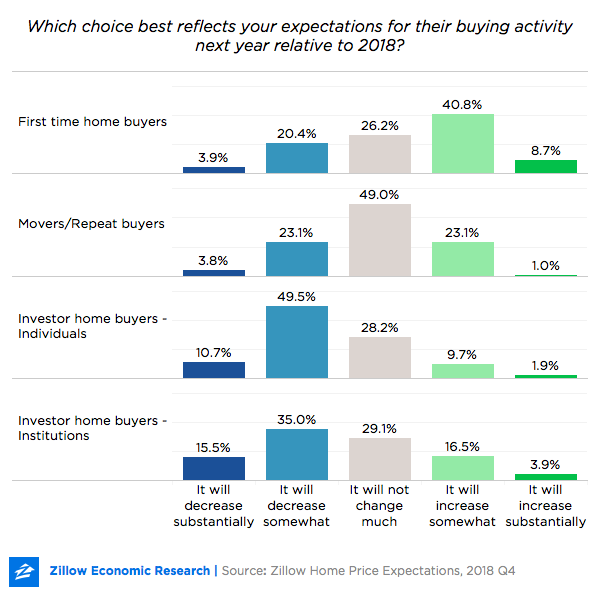Home value growth in several large U.S. markets – including a handful closely considered, but ultimately rejected, as potential landing spots for Amazon's coveted second headquarters – is expected to outperform the national average over the coming year, even as overall growth slows.
In addition to generally slower growth, anticipated upticks in first-time home buyers are likely to be countered somewhat by declines in individual and institutional investor activity in the housing market, according to 2018 Q4 Zillow Home Price Expectations Survey.[i] The quarterly survey, sponsored by Zillow and conducted by Pulsenomics LLC, asked more than 100 real estate economists and investment experts for their predictions about the U.S. housing market and future home value growth. Panelists were also asked which to identify three markets they believe are most likely to outperform the U.S., and three most likely to underperform in terms of 2019 home value appreciation.
The panel said they expected annual U.S. home value growth next year of 3.8 percent, on average, down from 4.2 percent in the previous quarter. The panel's expected long-term annual growth rate over the next five years ticked down to 3.4 percent.
Denver, Washington, D.C., Atlanta and Dallas were named as the four markets most likely to outperform the national average rate of home value appreciation.[ii] All four were on Amazon's final list of 20 candidate cities, before the retail giant selected the New York City and the Washington, D.C., metros to split the planned headquarters. Boston and Nashville, two other HQ2 finalist metros, also made the panelists' top-10 list. Nationwide, home values increased 7.7 percent year-over-year in October – and home value growth in Denver, Boston and Washington, D.C., lagged behind.
Last week, Zillow predicted areas that missed out on HQ2 would see more economic growth as other companies recognize the value in their proposals, led by investments from high-tech companies, as they are priced out of traditional tech hubs.
Still, courting Amazon and its expected 50,000 jobs didn't guarantee a rosy 2019 outlook. Chicago, also on the HQ2 short list, was considered the metro most likely to underperform against the national market. Chicago has struggled relative to most other markets to recover from the housing bust over the past decade, with home values still more than 13 percent below their pre-recession peaks. Baltimore was just ahead of Chicago on the list of expected underperformers.
The panelists also were pessimistic about San Diego and Los Angeles, where home value growth has outpaced the national average over the past few years, but has dipped below the national average so far this year. An equal number predicted the San Francisco market to overperform as underperform. Both of those California metros, along with the pricey Bay Area, are vulnerable to rising mortgage rates, tax code changes and affordability concerns.
More First-Time Buyers, Higher Homeownership
Panelists were also asked about their expectations for the homeownership rate and home buying activity in 2019 among first-time buyers, move-up/repeat buyers, individual investors and institutional investors. A large majority (84.3 percent) of respondents said they expected the U.S. homeownership rate to be higher in two years than it is today (64.4 percent as of Q3 2018), and a larger share (88.2 percent) thought homeownership would be higher in five years than it is today.
This expectation for higher homeownership may be grounded in higher expectations for consumer home buying activity going forward. Almost half (49.5 percent) of respondents said they expected activity among first-time home buyers to increase somewhat or substantially in 2019 compared to this year. Less than a quarter (24.3 percent) said they expected first-time home purchases to decrease somewhat or substantially in 2019. Roughly another quarter of respondents (26.2 percent) said they didn't expect first-time buying activity to change much either way.
To date, many would-be home buyers have faced some competition from institutional and individual investors that bought homes to convert into rentals. But going forward, this investor activity is expected to trail off at the same time as more individual buyer activity hits the market. Over half of panelists said they expected both individual investment activity and institutional home investment activity to decrease somewhat or substantially in 2019.
Even so, buying conditions themselves are likely to be somewhat worse next year as slower but still-rising housing costs and rising mortgage interest rates stretch buyers' budgets. Over the past few years, home prices have grown rapidly thanks in large part to rock-bottom, historically low mortgage interest rates that helped keep monthly mortgage payments low even as prices rapidly rose. That is beginning to change, and price growth can be expected to show more sensitivity to interest rates as rates climb back to levels more in line with historic norms. A majority (58 percent) of panelists said home values today were somewhat or much more sensitive to changing mortgage rates than in years past.
[i] This edition of the Zillow Home Price Expectations Survey surveyed 114 experts between Nov. 5, 2018 and Nov. 19, 2018. The survey was conducted by Pulsenomics LLC on behalf of Zillow, Inc.
[ii] Amazon's HQ2 announcement occurred Nov. 14, which was during the survey period.
The post Rejected Amazon HQ2 Finalists to be Among Nation's Fastest-Growing Markets in 2019 appeared first on Zillow Research.
via Rejected Amazon HQ2 Finalists to be Among Nation's Fastest-Growing Markets in 2019


No comments:
Post a Comment